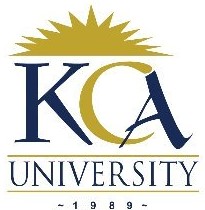
UNIVERSITY EXAMINATIONS: 2016/2017
EXAMINATION FOR THE DEGREES OF BACHELOR OF SCIENCE IN
INFORMATION TECHNOLOGY/ APPLIED COMPUTING/ BUSINESS IT
BIT2103 PRINCIPLES OF ARTIFICIAL INTELLIGENCE
FULLTIME/ PART TIME/ DISTANCE LEARNING
SUPPLEMENTARY/SPECIAL EXAMINATIONS
DATE: JULY, 2017 TIME: 2 HOURS
INSTRUCTIONS: Answer Question One & ANY OTHER TWO questions.
QUESTION ONE
a) State and explain three types of human intelligences [3 Marks]
b) Describe the meaning of the term “Artificial Intelligence” [2 Marks]
c) Discuss five elements of a search problem in artificial intelligence. [5 Marks]
d) State and explain any three knowledge representation techniques. [6 Marks]
(iii) Select any one knowledge representation techniques discussed above in (ii) and discuss how it may
be implemented. [3 Marks]
e) Explain the meaning of the terms “inference”, “backward chaining” and “forward chaining”
[3Marks].
(f) Explain any four applications examples of how artificial intelligence may be used in medicine and
industry. [4 Marks]
g) You are given an expert system with several rules pertaining to the behaviour of a certain animals
If X croaks and eats flies – Then X is a frog.
If X chirps and sings – Then X is a canary.
If X is a frog – Then X is green
If X is a canary – Then X is yellow
i) Your pet croaks and eats flies. Use forward chain to determine the colour of the pet?
[4 Marks]
QUESTION TWO
a) Describe two assumptions of knowledge representation. Use examples to explain your answer.
(4 Marks)
b) Describe four properties of a good knowledge representation technique (4 Marks)
c) Construct Semantic Net work of the following scenario (4 Marks)
Bird is an animal
Bird has part wing
Robin is a bird
Robin is a rusty
Robin is a red
d) Explain any three differences between procedural and declarative knowledge
(3 Marks)
e) Translate the following rule into a frame (3 Marks)
IF (hair) OR (drinks milk) THEN (mammal)
f) Briefly explain the meaning of the term ‘ heuristics’ in the context of artificial intelligence
(2 Marks)
QUESTION THREE
a) Briefly explain the meaning of the following concepts
i) Fuzzy logic reasoning (2 Marks)
ii) Case-based Reasoning (CBR) (2 Marks)
iii) State space (2 Marks)
b) Distinguish between deductive and inductive reasoning. Give an example for each case
(4 Marks)
c) State and explain any four characteristics of an intelligent agent (4 Marks)
(d). Describe three un informed searching methods (3 Marks)
(e).Briefly describe the meaning of the term ‘intelligent agent’. Give one example to illustrate your
answer (3 Marks)
QUESTION FOUR
(a) Explain the meaning term ‘expert systems’ [2 Marks]
(b) State and explain five components of an expert system. [5 Marks]
(c) Describe any three benefits of expert systems in modern society. [3 Marks]
(d) State and explain four participants of developing expert systems [4 Marks]
(e) Describe any two limitations of expert systems [2 Marks]
(f) Explain four differences between an Agents other software. [4 Marks]
QUESTION FIVE
(a) Intelligent agents interact with different types of environments. State and explain any four of these
environments [4 Marks].
(b) Briefly describe three limitations of hill climbing method in the context of artificial intelligence
[4 Marks]
(c) Briefly explain any two applications of robots in modern society. [2 Marks]
d) Describe the following intelligent tests in the context of artificial intelligence [4 Marks]
i.Turing Test.
ii.Chinese room.
(e) Briefly explain four elements of an intelligent agent [4 Marks]
(c) Describe the meaning of the term expert reasoning task as used in artificial intelligence [2 Marks]
